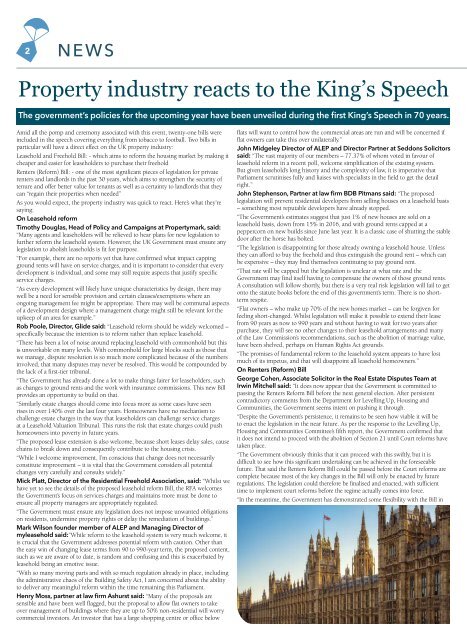You also want an ePaper? Increase the reach of your titles
YUMPU automatically turns print PDFs into web optimized ePapers that Google loves.
2<br />
NEWS<br />
3<br />
Property industry reacts to the King’s Speech<br />
The government’s policies for the upcoming year have been unveiled during the first King’s Speech in 70 years.<br />
Amid all the pomp and ceremony associated with this event, twenty-one bills were<br />
included in the speech covering everything from tobacco to football. Two bills in<br />
particular will have a direct effect on the UK property industry:<br />
Leasehold and Freehold Bill: - which aims to reform the housing market by making it<br />
cheaper and easier for leaseholders to purchase their freehold<br />
Renters (Reform) Bill: - one of the most significant pieces of legislation for private<br />
renters and landlords in the past 30 years, which aims to strengthen the security of<br />
tenure and offer better value for tenants as well as a certainty to landlords that they<br />
can “regain their properties when needed”<br />
As you would expect, the property industry was quick to react. Here’s what they’re<br />
saying:<br />
On Leasehold reform<br />
Timothy Douglas, Head of Policy and Campaigns at Propertymark, said:<br />
“Many agents and leaseholders will be relieved to hear plans for new legislation to<br />
further reform the leasehold system. However, the UK Government must ensure any<br />
legislation to abolish leaseholds is fit for purpose.<br />
“For example, there are no reports yet that have confirmed what impact capping<br />
ground rents will have on service charges, and it is important to consider that every<br />
development is individual, and some may still require aspects that justify specific<br />
service charges.<br />
“As every development will likely have unique characteristics by design, there may<br />
well be a need for sensible provision and certain clauses/exemptions where an<br />
ongoing management fee might be appropriate. There may well be communal aspects<br />
of a development design where a management charge might still be relevant for the<br />
upkeep of an area for example.”<br />
Rob Poole, Director, Glide said: “Leasehold reform should be widely welcomed –<br />
specifically because the intention is to reform rather than replace leasehold.<br />
“There has been a lot of noise around replacing leasehold with commonhold but this<br />
is unworkable on many levels. With commonhold for large blocks such as those that<br />
we manage, dispute resolution is so much more complicated because of the numbers<br />
involved, that many disputes may never be resolved. This would be compounded by<br />
the lack of a first-tier tribunal.<br />
“The Government has already done a lot to make things fairer for leaseholders, such<br />
as changes to ground rents and the work with insurance commissions. This new Bill<br />
provides an opportunity to build on that.<br />
“Similarly estate charges should come into focus more as some cases have seen<br />
rises in over 140% over the last four years. Homeowners have no mechanism to<br />
challenge estate charges in the way that leaseholders can challenge service charges<br />
at a Leasehold Valuation Tribunal. This runs the risk that estate charges could push<br />
homeowners into poverty in future years.<br />
“The proposed lease extension is also welcome, because short leases delay sales, cause<br />
chains to break down and consequently contribute to the housing crisis.<br />
“While I welcome improvement, I’m conscious that change does not necessarily<br />
constitute improvement – it is vital that the Government considers all potential<br />
changes very carefully and consults widely.”<br />
Mick Platt, Director of the Residential Freehold Association, said: “Whilst we<br />
have yet to see the details of the proposed leasehold reform Bill, the RFA welcomes<br />
the Government’s focus on services charges and maintains more must be done to<br />
ensure all property managers are appropriately regulated.<br />
“The Government must ensure any legislation does not impose unwanted obligations<br />
on residents, undermine property rights or delay the remediation of buildings.”<br />
Mark Wilson founder member of ALEP and Managing Director of<br />
myleasehold said:”While reform to the leasehold system is very much welcome, it<br />
is crucial that the Government addresses potential reform with caution. Other than<br />
the easy win of changing lease terms from 90 to 990-year term, the proposed content,<br />
such as we are aware of to date, is random and confusing and this is exacerbated by<br />
leasehold being an emotive issue.<br />
“With so many moving parts and with so much regulation already in place, including<br />
the administrative chaos of the Building Safety Act, I am concerned about the ability<br />
to deliver any meaningful reform within the time remaining this Parliament.<br />
Henry Moss, partner at law firm Ashurst said: “Many of the proposals are<br />
sensible and have been well flagged, but the proposal to allow flat owners to take<br />
over management of buildings where they are up to 50% non-residential will worry<br />
commercial investors. An investor that has a large shopping centre or office below<br />
flats will want to control how the commercial areas are run and will be concerned if<br />
flat owners can take this over unilaterally.”<br />
John Midgeley Director of ALEP and Director Partner at Seddons Solicitors<br />
said: “The vast majority of our members – 77.37% of whom voted in favour of<br />
leasehold reform in a recent poll, welcome simplification of the existing system.<br />
But given leasehold’s long history and the complexity of law, it is imperative that<br />
Parliament scrutinises fully and liaises with specialists in the field to get the detail<br />
right.”<br />
John Stephenson, Partner at law firm BDB Pitmans said: “The proposed<br />
legislation will prevent residential developers from selling houses on a leasehold basis<br />
– something most reputable developers have already stopped.<br />
“The Government’s estimates suggest that just 1% of new houses are sold on a<br />
leasehold basis, down from 15% in 2016, and with ground rents capped at a<br />
peppercorn on new builds since June last year. It is a classic case of shutting the stable<br />
door after the horse has bolted.<br />
“The legislation is disappointing for those already owning a leasehold house. Unless<br />
they can afford to buy the freehold and thus extinguish the ground rent – which can<br />
be expensive – they may find themselves continuing to pay ground rent.<br />
“That rate will be capped but the legislation is unclear at what rate and the<br />
Government may find itself having to compensate the owners of those ground rents.<br />
A consultation will follow shortly, but there is a very real risk legislation will fail to get<br />
onto the statute books before the end of this government’s term. There is no shortterm<br />
respite.<br />
“Flat owners – who make up 70% of the new homes market – can be forgiven for<br />
feeling short-changed. Whilst legislation will make it possible to extend their lease<br />
from 90 years as now to 990 years and without having to wait for two years after<br />
purchase, they will see no other changes to their leasehold arrangements and many<br />
of the Law Commission’s recommendations, such as the abolition of marriage value,<br />
have been shelved, perhaps on Human Rights Act grounds.<br />
“The promises of fundamental reform to the leasehold system appears to have lost<br />
much of its impetus, and that will disappoint all leasehold homeowners.”<br />
On Renters (Reform) Bill<br />
George Cohen, Associate Solicitor in the Real Estate Disputes Team at<br />
Irwin Mitchell said: “It does now appear that the Government is committed to<br />
passing the Renters Reform Bill before the next general election. After persistent<br />
contradictory comments from the Department for Levelling Up, Housing and<br />
Communities, the Government seems intent on pushing it through.<br />
“Despite the Government’s persistence, it remains to be seen how viable it will be<br />
to enact the legislation in the near future. As per the response to the Levelling Up,<br />
Housing and Communities Committee’s fifth report, the Government confirmed that<br />
it does not intend to proceed with the abolition of Section 21 until Court reforms have<br />
taken place.<br />
“The Government obviously thinks that it can proceed with this swiftly, but it is<br />
difficult to see how this significant undertaking can be achieved in the foreseeable<br />
future. That said the Renters Reform Bill could be passed before the Court reforms are<br />
complete because most of the key changes in the Bill will only be enacted by future<br />
regulations. The legislation could therefore be finalised and enacted, with sufficient<br />
time to implement court reforms before the regime actually comes into force.<br />
“In the meantime, the Government has demonstrated some flexibility with the Bill in<br />
response to the Levelling Up, Housing and Communities Committee’s fifth report. For<br />
example, the Government has accepted comments that the student housing market will<br />
need to retain the expectation of short-term lets.<br />
“The Government has not been convinced to keep fixed-term tenancies, but instead,<br />
will include a new ground for possession to facilitate the yearly cycle of student lets. It<br />
remains to be seen exactly how the new ground will operate, and whether it will satisfy<br />
the concerns of those in the student housing market.”<br />
Jonathan Daines, Founder and CEO of lettingaproperty.com said: “The Kings<br />
Speech has done little to provide clarity on the proposed Renters (Reform) Bill, with<br />
timescale and extent still uncertain, but did confirm the Government’s commitment to<br />
the bill. While we fully support its underlying purpose, in ensuring tenants can enjoy a<br />
safe and stable living environment, there’s a danger that legislating for rogue landlords<br />
can indirectly penalise responsible landlords, like those within our own community.<br />
“Many of these landlords are already struggling to keep pace with increasingly complex<br />
lettings legislation. Adding further layers of compliance and administration could<br />
Competition among sellers sees the largest pre-Christmas<br />
fall of asking prices in five years: Rightmove<br />
The latest data released by Rightmove has revealed that<br />
sellers are prepared to offer considerable discounts ahead<br />
of Christmas this year to attract a buyer.<br />
While asking prices usually drop at this time of year, the fall recorded by Rightmove<br />
this month is the largest November drop in five years, indicating that new sellers<br />
are also increasingly adopting more realistic price expectations from the outset of<br />
marketing to tempt potential buyers to act.<br />
According to the figures, new seller asking prices fell to £362,143 - a drop of 1.7% or<br />
-£6,088.<br />
As we approach the end of 2023, key indicators point to a market that while<br />
challenging, has been more positive than many predicted.<br />
Tim Bannister Rightmove’s Director of Property Science said: “We’d expect<br />
to see a drop in new seller asking prices in the last couple of months of the year, as<br />
serious sellers start to separate themselves from discretionary sellers and cut through<br />
the Christmas noise with an attractive price to secure a buyer.<br />
“However, the larger-than-usual drop this month signals that among the usual pricing<br />
seasonality, we are starting to see more new sellers heed their agents’ advice and<br />
come to market with more enticing prices to stand out from their over-optimistic<br />
competition. Buyers are still out there, but for many their affordability is much<br />
reduced due to higher mortgage rates.<br />
“It now looks like more sellers are understanding Rightmove’s research; that the<br />
chances of securing a buyer are much greater if they price right the first time, rather<br />
than over-pricing and reducing their price later.”<br />
Despite the turbulent end to 2022, the year to date has been better than many<br />
expected. Asking prices have eased from the unsustainably frothy heights seen during<br />
the pandemic markets, where many sales went to best and final bids.<br />
However, new seller asking prices are now just 3% behind May’s peak and this<br />
relatively small fall in asking prices, coupled with stable numbers of new properties<br />
coming to the market each month, are strong indicators that forced sales are not<br />
widespread.<br />
The number of sales being agreed is now 10% below the same period in 2019,<br />
improving from being 15% below 2019’s level last month. The pandemic-driven<br />
www.thepropertydrop.co.uk<br />
01600 717255<br />
info@thepropertydrop.co.uk<br />
Whilst every care is taken with materials submitted to The Property Drop the publisher cannot accept responsibility for loss<br />
or damage to such materials. Opinions expressed in articles are strictly those of the authors. This publication is copyright<br />
bedroom<br />
and may not be reproduced in any form without written permission from the publishers. Prices and details are subject to<br />
change and the publisher can take no responsibility for omissions or errors. The inclusion of an advertiser in this paper is not<br />
necessarily a recommendation. ©The Property Drop 2023.<br />
place additional strain on ethical landlords, who are already committed to providing a<br />
good experience for their tenants. It’s important to strike a balance between protecting<br />
tenants and ensuring that responsible landlords are not unduly burdened by any new<br />
requirements.<br />
“The Government must refine and implement these measures effectively, considering<br />
the practical implications for those who are already working to combat poor landlord<br />
practices. We urge the Government to work closely with industry stakeholders to<br />
ensure that responsible landlords – not to mention letting agents – are not unfairly<br />
burdened by additional compliance and administrative requirements, which could<br />
inadvertently stifle the supply of high-quality rental properties.”<br />
Henry Moss, partner at law firm Ashurst said: “It feels like the Government<br />
are trying to look like they are taking action while actually kicking the can. Nofault<br />
evictions will stay in place until new court processes are in place, and there is<br />
no deadline for upgrading homes with poor energy efficiency. This just increases<br />
uncertainty for investors as to when and how rules will apply”<br />
stock shortage also now appears to be over, with the number of available homes for<br />
sale now just 1% behind this time in 2019.<br />
While there is certainly no glut of homes for sale, buyers across Great Britain are<br />
likely to see much more choice in their local area compared to a year ago.<br />
However, these are averages across Great Britain, and in the current very pricesensitive<br />
market some areas and sectors are faring better than others during this<br />
period of pricing transition. The number of sales being agreed in the smallest homes<br />
sector (studio, one-, and two-bed properties) is just 7% lower than 2019’s level,<br />
compared to the largest homes sector (four-bed detached houses and all five-bed plus<br />
properties), where agreed sales are 14% behind 2019.<br />
Meanwhile, there are yearly price declines in the Midlands and all Southern regions,<br />
however, the more affordable areas of Wales, Scotland and the North of England have<br />
seen asking price rises, as the changed market conditions affect local housing markets<br />
in different ways.<br />
Last week, the Bank of England opted to hold the Base Rate for the second<br />
consecutive time, which has supported buyer demand and helped to keep it in line<br />
with 2019’s level. Now, many will be looking to the forthcoming Autumn Statement<br />
for any policy announcements or market incentives.<br />
One rumoured announcement is a renewal of the mortgage guarantee scheme, which<br />
encourages lenders to offer a 95% Loan-To-Value mortgage helping those with a<br />
smaller deposit. However, data from the Bank of England and the Financial Conduct<br />
Authority (FCA) shows only around 5% of mortgages taken out are of this kind,<br />
highlighting the limitations of the scheme.<br />
Tim Bannister adds: “This year has brought many new challenges for buyers,<br />
sellers and agents to navigate. While there have been many twists and turns, and<br />
there are still seven weeks left of the year, the data indicates that there has been more<br />
to be positive about in 2023 than many thought there would be at this time last<br />
year. The upcoming Autumn Statement will now set the tone heading into 2024,<br />
particularly if there are any major policy announcements.<br />
He concluded: “We hope that the government has considered the impact on the<br />
market of any new policies and that any measures introduced help as many movers<br />
as possible. An announcement as limited as a mortgage guarantee scheme renewal<br />
would be a missed opportunity to provide some support to movers, particularly firsttime<br />
buyers.”<br />
bathroom<br />
The icons under the properties throughout<br />
Property Drop indicate the following:<br />
bedroom<br />
bathroom<br />
living room etc<br />
bathroom<br />
bedroom<br />
bedroom<br />
Number of<br />
bedrooms<br />
bedroom<br />
living room etc<br />
Number bathroom of<br />
bathroom<br />
living room central etc heating<br />
bathroom garage/covered parking<br />
central heating<br />
garage/covered parking<br />
living room etc<br />
bedroom<br />
living room etc<br />
living room etc<br />
reception<br />
rooms<br />
central heating<br />
garage/covered parking<br />
Number of<br />
bathrooms<br />
garage/covered parking<br />
central heating<br />
central heating<br />
central heating<br />
parking<br />
parking<br />
ELECTRIC<br />
Method of<br />
central<br />
heating<br />
Covered<br />
garage<br />
parking<br />
parking<br />
Parking<br />
space<br />
garage/covered parking<br />
parking<br />
garage/covered parking<br />
parking

















